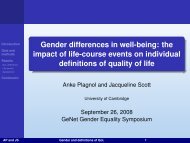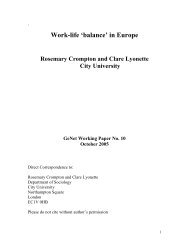Job insecurity, gender and work orientation: an exploratory ... - GeNet
Job insecurity, gender and work orientation: an exploratory ... - GeNet
Job insecurity, gender and work orientation: an exploratory ... - GeNet
You also want an ePaper? Increase the reach of your titles
YUMPU automatically turns print PDFs into web optimized ePapers that Google loves.
Table 5<br />
Conditions <strong><strong>an</strong>d</strong> consequences of women’s experiences of job<br />
Conditions contributing to Consequences<br />
experiences of job <strong>insecurity</strong><br />
Bal<strong>an</strong>cers<br />
JI as crisis Divorced - sole breadwinner Cost<br />
Lack of support net<strong>work</strong><br />
loss of fin<strong>an</strong>cial<br />
outside <strong>work</strong> security <strong><strong>an</strong>d</strong> group<br />
support<br />
JI as way out Full-time <strong>work</strong>ing partner Cost<br />
Heavy dem<strong><strong>an</strong>d</strong>s in terms of childcare Loss of employment/<br />
Lack of good quality childcare promotion opportunities<br />
Benefit<br />
Some relief from<br />
<strong>work</strong> overload<br />
JI as reappraisal Previous exposure to job <strong>insecurity</strong> Cost<br />
Partner’s response to <strong>insecurity</strong> Difficulties with relationships<br />
In the short-term.<br />
Benefit<br />
More egalitari<strong>an</strong> roles<br />
Greater resilience to latest<br />
exposure to job <strong>insecurity</strong><br />
Traditionalists Full-time <strong>work</strong>ing partner Cost<br />
Low skills Loss of social contact<br />
Lack of good quality childcare <strong><strong>an</strong>d</strong> confidence<br />
Benefit<br />
Partner’s salary acts as<br />
buffer<br />
Ambitious Sole earners Cost<br />
Concern with extended families Loss of promotion<br />
Fin<strong>an</strong>cial well-being opportunities<br />
Difficulties providing for<br />
extended family<br />
Men’s <strong>orientation</strong>s to <strong>work</strong> <strong><strong>an</strong>d</strong> family<br />
According to Hakim (2000), most men will be fully committed to employment activities,<br />
some men will w<strong>an</strong>t to combine <strong>work</strong> <strong><strong>an</strong>d</strong> family, <strong><strong>an</strong>d</strong> a tiny minority will w<strong>an</strong>t to<br />
dedicate themselves to family activities. Pleck, on the other h<strong><strong>an</strong>d</strong>, argues that m<strong>an</strong>y men<br />
16






